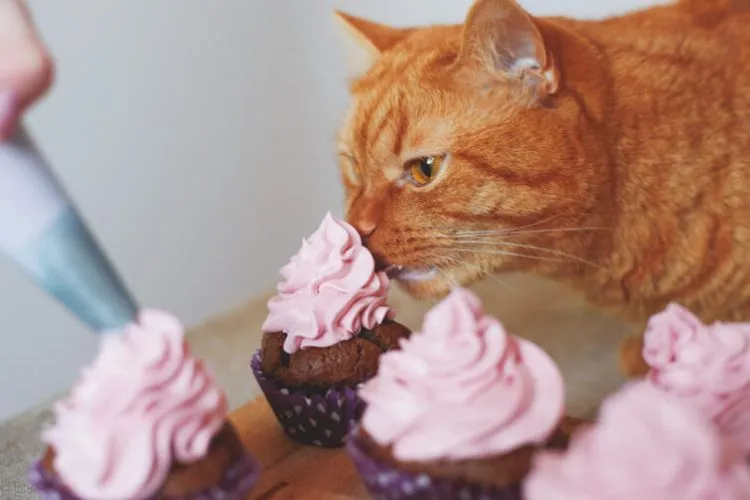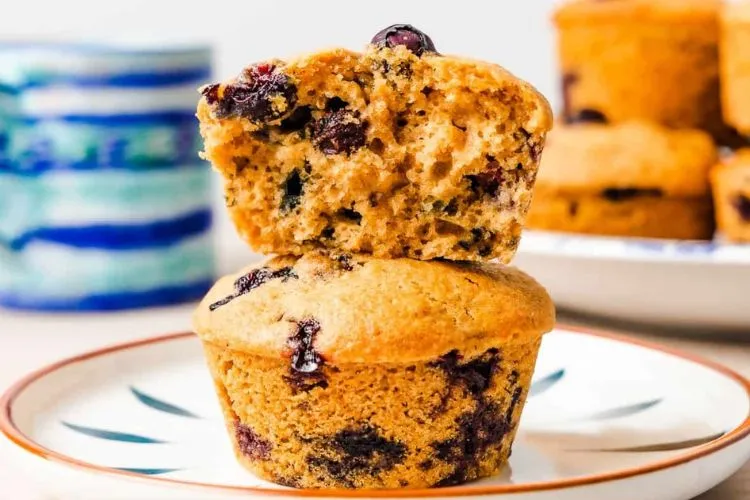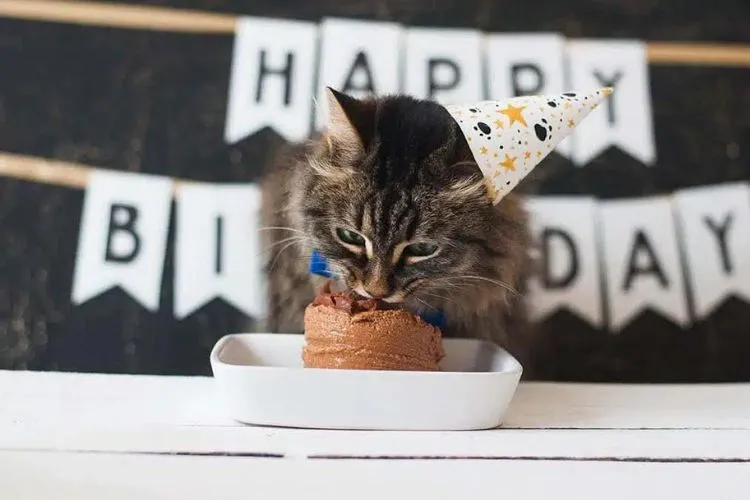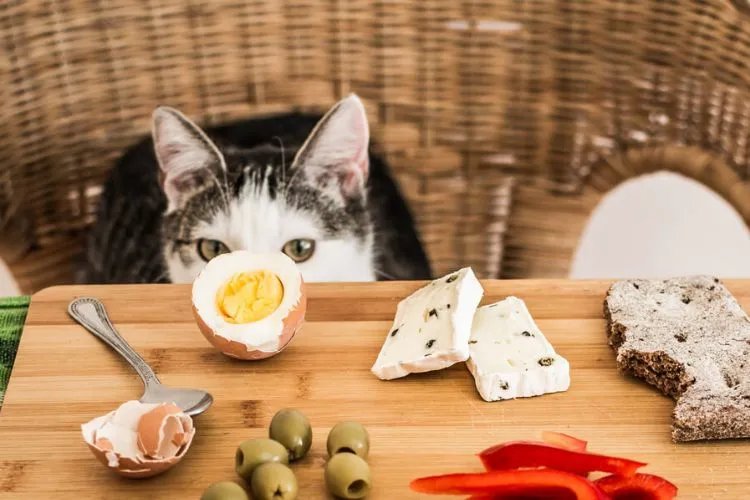Muffins are a popular treat among humans, with a wide variety of flavors and ingredients that cater to different tastes and dietary needs.
As cat owners, we often find ourselves wanting to share our favorite snacks with our furry companions. But the question arises: Can cats eat muffins?

This article dives into the nutritional needs of cats, the potential risks and benefits of feeding them muffins, and provides safer alternatives for treating your feline friend.
🐾 Understanding Cats’ Nutritional Needs
Cats are carnivores by nature. Their diet requires a high amount of protein that comes from meat. They have specific needs for certain amino acids, such as taurine, which are found in animal tissue.
Unlike humans, cats have little nutritional need for carbohydrates. Knowing this, it becomes clear that human foods, including muffins, might not always align with what is best for our cats’ health.
🐾 Can Cats Eat Muffins? The Basics
In short, cats can eat muffins, but it should be an occasional treat and not a regular part of their diet. Plain muffins without added sugar or harmful ingredients might be less risky.

However, most muffins contain elements that are not ideal for cats, and some can even be dangerous.
Ingredients in Muffins: What’s Safe and What’s Not?
When it comes to muffins, not all ingredients are created equal, especially in the eyes of our feline friends.
- Flour: is generally safe but offers no nutritional benefit to cats and can contribute to obesity.
- Sugar: and artificial sweeteners, particularly xylitol, are harmful to cats. Xylitol can cause liver failure and hypoglycemia.
- Chocolate: is toxic to cats and can lead to serious health issues.
- Raisins and grapes: can cause kidney failure in cats and should always be avoided.
- Nuts: especially macadamia nuts, are toxic to cats.
- Dairy products: can cause digestive upset in cats, as many are lactose intolerant.
There are, however, some ingredients like cooked pumpkin and blueberries that can be found in muffins and are safe for cats in small amounts.
Health Implications of Feeding Muffins to Cats
Feeding muffins to cats can lead to a range of health issues. The immediate concerns might include digestive upset, such as diarrhea or vomiting.
Over time, high-calorie treats like muffins can contribute to obesity and related health problems, including diabetes. Moreover, the toxic ingredients found in some muffins can lead to more severe conditions, requiring immediate veterinary care.
🐾 Safer Alternatives to Muffins for Cats
Treating our cats doesn’t have to involve sharing human food, which may not always be safe for them. There are plenty of healthier alternatives that cater specifically to a cat’s dietary needs, ensuring they enjoy their treats without any health risks.

Here’s a detailed look into safer treat options for cats, including both store-bought and homemade treats.
Store-Bought Cat Treats
Store-bought treats designed for cats are a convenient option. These treats are formulated to meet the nutritional requirements of cats, providing a balance of proteins, vitamins, and minerals.
Unlike human food, these treats avoid sugars, excessive fats, and harmful ingredients that could negatively affect a cat’s health.
When choosing store-bought treats, look for those with high-quality ingredients and minimal additives to ensure your cat is getting a healthy snack.
Homemade Cat Treats
For cat owners who prefer to know exactly what’s in their pet’s treats, homemade options are an excellent choice. You can create nutritious and delicious treats at home using cat-safe ingredients.
Fish and Pumpkin Treats
A simple recipe involves combining cooked fish (such as salmon or tuna) with pureed pumpkin and a bit of flour to bind the ingredients.
Roll the mixture into small pieces and bake until crispy. This treat is not only safe but also beneficial for cats, offering omega-3 fatty acids from the fish and fiber from the pumpkin.
Chicken and Vegetable Bites
Another healthy recipe includes blending cooked chicken with a spoonful of cat-friendly vegetables (like steamed carrots or broccoli) and a sprinkle of catnip or turmeric.
The chicken offers high-quality protein, the vegetables provide essential nutrients, and the catnip or turmeric adds an appealing flavor for cats, with the added benefit of turmeric’s anti-inflammatory properties.
Homemade treats allow cat owners to control their pet’s diet closely, ensuring they’re fed safe, nutritious ingredients.
Whether you choose store-bought or homemade treats, it’s important to introduce them gradually and ensure they don’t exceed 10% of your cat’s daily caloric intake. This way, you can treat your cat without compromising their health or dietary needs.
🐾 Pro Tips for Feeding Your Cat Human Foods
If you decide to give your cat a piece of muffin or any human food, it’s crucial to introduce it slowly and in small amounts. Watch for any adverse reactions.

Always consult with a veterinarian before making significant changes to your cat’s diet, especially if introducing new human foods.
While we’re discussing what cats can eat, it’s not unusual to wonder, “Can cats eat donuts?” or “Can cats have popcorn?” Similar to muffins, the potential consumption of these foods by our feline companions raises questions about their dietary safety.
As conscientious pet owners, it’s vital to understand how these snack foods might impact our cats’ health.
🐾 Frequently Asked Questions (FAQs)
While blueberries are safe for cats, the muffin base might not be. It’s best to give blueberries as a standalone treat.
Treats, including pieces of muffin, should make up no more than 10% of your cat’s daily caloric intake. It’s best to keep it to a minimum.
If your cat consumes chocolate, xylitol, or any other toxic ingredient, contact a veterinarian immediately.
Grain-free does not necessarily mean safer or healthier for cats. Focus on the overall ingredients rather than just the absence of grains.
Kittens have even more specific dietary needs for their growth and development. It’s best to avoid giving them muffins altogether.
Conclusion:
While it’s tempting to share our treats with our cats, their health and nutritional needs differ greatly from ours. Muffins, though harmless in small amounts, are not an ideal treat for cats due to their ingredients and lack of nutritional value.
By choosing safer, cat-specific treat options and consulting with your veterinarian, you can ensure your cat stays healthy and happy.
